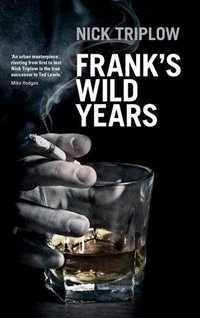Frank Neaves is a barfly. He is pretty much down-and-out in the London postcode SE8, and the centre of his known world is the public bar of the John Evelyn pub in Deptford. When he’s in funds he can nurse a pint like a long-distance expert but when he has no money he’s at the mercy of Adeline the barmaid, or the reclusive landlord Carl Price, whose solitary pleasure is to sit in front of an antiquated TV and video set-up watching black and white re-runs of long-forgotten boxing matches. Carl had a wife, Diane. But then she ran off to Hull with their soft drinks provider, taking with her the light of Carl’s life, their daughter Grace.
As the narrative unfolds we learn more about the characters. Carl is the surviving son of a notorious south London mobster whose firm terrorised the mean streets of Deptford, Catford and New Cross. After his father died of cancer, Carl had no stomach to carry on with the villainy, and retreated into the safer world of being a pub landlord. Frank, on the other hand, was the unwilling driver, fixer and brains of Dave Price’s mob, until he was framed for a gangland killing and sent down for 15 years, losing his wife and daughter in the process.
When Diane, bullied by her abusive partner, reneges on the arrangement to let Grace spend New Year with Carl, he sets off on a lone mission to the snowy wastes of Hull to bring back his daughter. Back at the John Evelyn, Adeline, realising that Carl will be no match for the violent and all-too-predictable John O’Keefe, persuades Frank to accompany her on a mission to rescue Carl from his mission.
There is a melancholy lyricism about the writing. John Betjeman evoked a certain kind of Englishness in his poems by using familiar brand names, and Nick Triplow does something similar here. The not-too-distant past is recalled via Consulate cigarettes, a television from Visionhire, Brylcream, Oxo and Sta-Prest trousers. This poetry of mundanity sits comfortably with the pinpoint clarity of the descriptions of a typical shut-down England between Christmas and New Year, repeats of The Great Escape on the television, slush covered half-empty streets, and trains that don’t run.
The book’s title is a reference to an album by Tom Waits, but I also sensed throughout that there was a definite homage being paid to certain kinds of Western movies. Despite his general lack of graces, Carl has about him something of the Jimmy Stewart character in The Man Who Shot Liberty Valance, and Adeline is the archetypal bad girl with a heart of gold – maybe Angie Dickinson in Rio Bravo. Frank – well, Frank could be almost anyone from Gary Cooper to Clint Eastwood as he suffers repeated indignities at the hands of the bad men until he finally cracks and wreaks his revenge before riding off into the sunset.
There is little to dislike in this book. Maybe Frank’s continued survival, despite no apparent income or visible means of support is a little perplexing. And would the local police be so easily shooed away from the scene of a fairly major domestic dispute by the deeply unpleasant O’Keefe brothers? Despite the grimy setting and the superficial unloveliness of the characters, a certain kind of nobility emerged, and my lasting impression was of a strangely elegiac novel where ghosts are exorcised and a state of redemption is reached.
Caffeine Nights Publishing
Print/Kindle
£1.93
CFL Rating: 4 Stars
